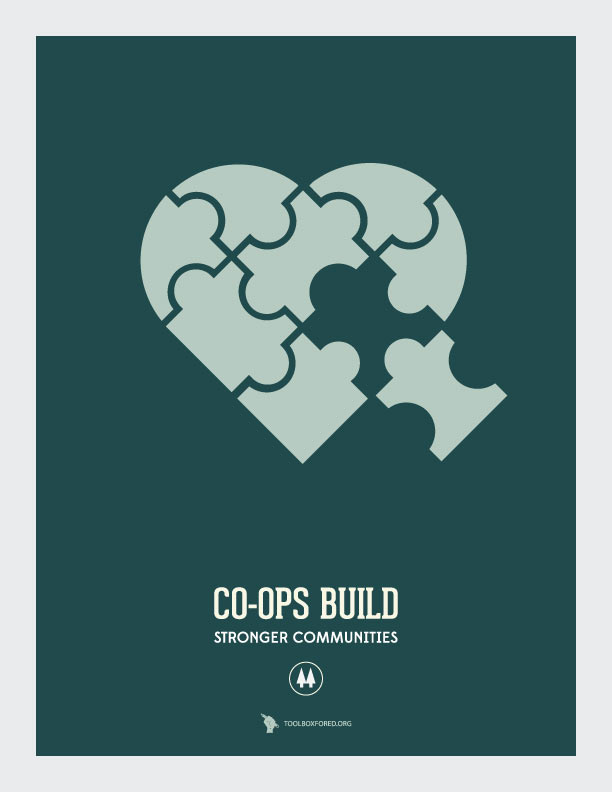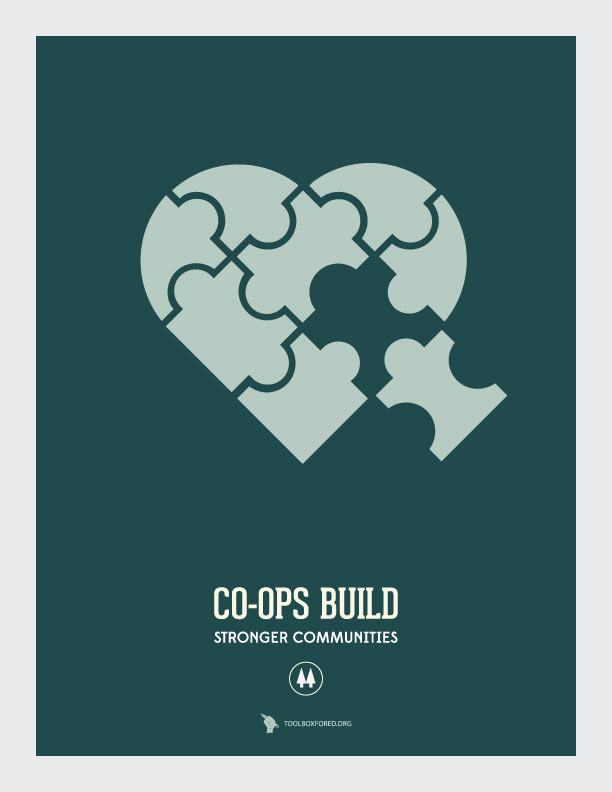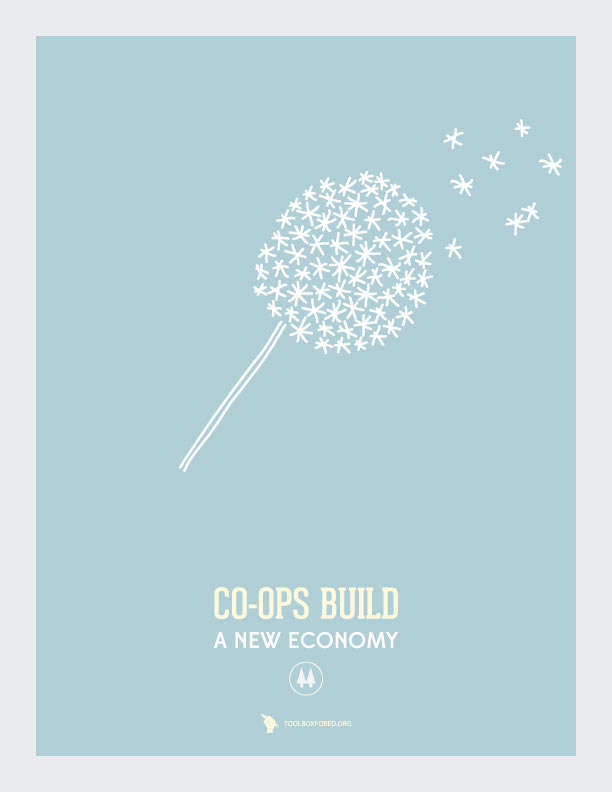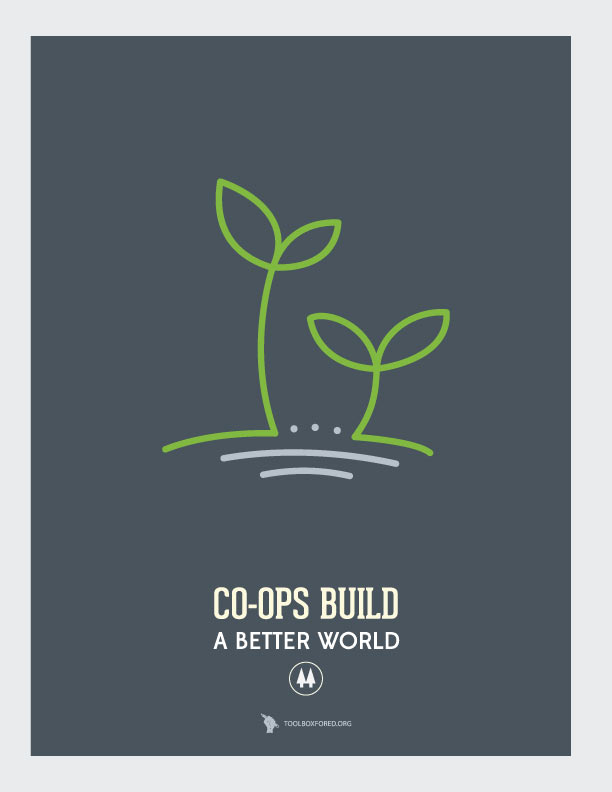Cooperatives are businesses and organizations democratically owned and managed by the people they serve. They come in many shapes and sizes: from a handful of people to thousands upon thousands of members. Some are owned and run by workers, others are owned and governed by consumers, still others are for producers (like farmers and artists). But no matter what, cooperatives always have the same foundation: one member, one share, one vote.
Recently, we at The Toolbox for Education and Social Action (TESA) (a worker co-op) launched a new poster series to highlight and celebrate the power of the cooperative movement. Below, we’re sharing each of the posters while also going further into depth about how co-ops build stronger communities, a new economy, and a better world.
Cooperatives build stronger communities by keeping money, resources, jobs, and economic control local. Their impact has been so widespread and significant that more businesses are electing to transition into cooperatives. Like the Island Employee Cooperative (IEC) in rural Maine, where the retiring owners decided to sell their businesses to their employees, rather than an outside investor who would surely have made lay-offs and service cut-backs. Since buying-out their jobs, the retail workers at IEC have increased their pay, acquired benefits, shared in the business’s profits, and even brought the local community college system into their stores to help teach the new owners (the employees!) practical business skills. All of these things are rare in the retail world for workers, but it’s possible at the IEC in Deer Isle, Maine, thanks to the cooperative model.
And in Chicago, when window factory employees had their jobs ripped away from them not once but twice, they decided to found their own business: “Everyone decided enough was enough,” New Era’s website declares. “If we want to keep quality manufacturing jobs in our communities, perhaps we should put in charge those who have the most at stake in keeping those jobs — the workers. The plan to start a new worker owned cooperative business began.”
And so New Era Windows was born, where no workers could be fired simply because the bosses wanted to save money. The late Ricky Macklin, who was instrumental in organizing the founding of New Era, said in Own the Change, the documentary TESA co-produced with The Laura Flanders Show about cooperatives, that the co-op model opened new frontiers for the factory workers:
All of our lives, we’ve been told we was only this, and we was only that. And New Era Cooperative allowed us to see that we was much more than that. Actually, what really surprised all of us… at Republic, we only thought we only knew how to make windows, because this is what we were told – is that we were window makers. When we moved into our own plant, we found out that we was electricians, we found out that we was plumbers, we found out that we were people of industry. I found out I was a salesman.
But even taking a step back, we can see that cooperatives are helping to transform not only individual businesses and lives, but entire communities – cities, towns, and regions. Cooperatives in Madison, WI have a strong history of working together to make it easier for more people to start co-ops as well as to improve the situation of their other fellow co-ops in the city. More efforts like these have sprung up around the country – like with the Philadelphia Area Cooperative Alliance.
In fact, cooperatives are taking center stage in the effort to build community wealth that is controlled and owned by the people. And their cities are beginning to take notice. In 2011, the Mayor of Richmond, CA, a highly impoverished post-industrial city, hired a cooperative developer to help launch more co-ops, with the aim to build and retain equitable wealth for community members. Over in the rust belt, Cleveland’s municipal government helped fund the launch of the Evergreen Cooperatives: eco-friendly businesses that are rooted in serving local institutions, like hospitals and universities. Intrigued by Evergreen’s success, Rochester, NY contributed $100,000 towards replicating the model in their city. Madison, WI was so impressed by the impact of cooperatives that they decided to invest $5 million in launching more democratically-owned and governed businesses. And New York City, compelled by worker cooperative advocates, has twice agreed to contribute millions to launching co-ops. Already, this contribution is improving New York communities: like the neighborhood of Bed-Stuy, which is using cooperatives to challenge gentrification.
Indeed, cooperatives can often build stronger communities by directly serving those that have been disenfranchised or persecuted. This includes providing reasonable and healthy food access to people who live below the poverty line and those in food deserts. This is what the Mariposa Cooperative in Philadelphia does and the Renaissance Cooperative, which is trying to launch in Greensboro, NC, will aim to achieve. In Queens, NYC, eight transgender Latina women are founding a worker cooperative together that will be a beauty-focused business: “Their business, the first of its kind in New York City, aims to provide stable and dignified jobs for the women and to serve as a model to other transgender workers who have faced employment discrimination.”
Cooperatives are also working on a more macro-scale and building towards a new economy – one based on mutual aid, solidarity, and democracy. But this isn’t something that’s just started, cooperatives, cooperation, and communism has a long history in North America. And while it’s obvious we are nowhere close to living in a cooperative economy yet, these efforts have had tremendous impacts and benefits for millions of people. For instance, cooperatives are some of the leading forces in challenging and transforming industries. Union Cab of Madison, a cooperative taxi company, is equally owned by everyone from the drivers to the dispatchers. In the company, workers elect the board of directors and other decision-making positions. Because of this, cab drivers at Union Cab make better money and have more job security than normal. It’s astounding to learn that at a typical cab company, a driver might owe money to the taxi company on a bad day. This sort of abuse will never happen at the cooperative cab company, because it’s accountable to the people who work there. Union Cab is also one of the only cab businesses to provide health insurance to its drivers. That’s a wonderful achievement, in the face of a traditionally exploitative industry.
At the same time, cooperatives are transforming the way things are done in the tech industry by empowering people to come together for the benefit of workers, women, and people of color. Jill Dimond, a co-founder of the Sassafras Tech Collective, puts it this way:
In having a democratic workplace where everyone is a worker and an owner, we thought that we could help bring about social change by starting with ourselves. As a woman in technology, I have long been concerned about diversity issues in computing. By creating a more egalitarian workplace, we hope to also create a safe space for those who are underrepresented in tech such as women and people of color.
From that same article (which we wrote), Ole Olson of the Isthmus Engineering Cooperative, adds:
Most people are used to just being employees at other companies. When given the responsibility and power to make their own decisions, it is amazing how some people change.
Those in tech cooperatives believe in their model so much that they even put together a handbook to help others launch their own tech co-ops.
In Puerto Rico, prisoners started a cooperative to improve their lives and financial stability both inside of prison and once they get out. This is a critical undertaking, given how difficult it is for former prisoners to find jobs, which often contributes to high poverty levels and re-incarceration rates. Meanwhile, in Maine, a bold new co-op has been launched that’s membership is made up of a combination of food prep workers, farmers, fishers, and consumers, and which is striving to completely revolutionize the state’s food system.
Of course, there’s always the threat that once businesses that mean well become successful, they might sell out, tempted by wealth or the need to capitalize in order to expand their operations. This type of thing happens more often than we’d like to think. Yet, selling-out is extremely unlikely with the cooperative model, as the membership would have to agree to sell off their business. And Equal Exchange, a cooperative distributor of fair trade products (like coffee and chocolate), put together a genius campaign for raising capital without selling their business to outside shareholders or a larger company. This means the control and ownership stayed with the the members, and Equal Exchange’s expansion was financed by their community.
Beyond that, however, is the emergence of supposedly “do-good” companies that are really wolves in sheep’s clothes, like the so-called sharing economy’s Uber. Even here, cooperatives are the ones leading the charge to transform that industry by creating their own cooperative alternatives.
Perhaps one of the biggest marks of the cooperative movement’s impact is that it is not limited to one town, region, or country. Cooperatives are shaping the entire globe. In Spain, the Mondragon Cooperative System is built up of more than a hundred worker cooperatives and tens of thousands of worker-owners. This system of co-ops was launched in the 1950s – which is incredible, because a democratically-owned system of workplaces was built in the face of quite literal fascist repression. To this day, Mondragon has only lost a few cooperative businesses. That’s an astounding success rate, especially when the rest of Spain has been plagued by such serious economic troubles that have left millions in deep poverty. Meanwhile, in Argentina, many workers took over their factories and re-launched them as cooperatives when the country’s economy collapsed. Emilia Romagna, a part of Italy, is one of the strongest economic regions in all of Europe, which is because it is also one of the most cooperative regions in all of Europe. The area has a population of around 4.5 million, and every two out of three citizens is a member of one of the region’s cooperatives! Co-ops also produce roughly 30% of Emilia Romagna’s GDP, 10% of the workers are employed by co-ops, and the region has some of the lowest unemployment figures in Europe. There are about 7,500 cooperatives in Emilia Romagna, and close to two-thirds of those are worker-owned and run.
But it doesn’t stop there. Cooperatives are prevalent within Japan’s healthcare system, in Korea, and in India’s coffee houses. Cuba is also turning to the cooperative model as it tries to transform the nature of its economy. Across the world, youth are stepping up to launch new cooperatives so that they can democratically own their futures. In fact, worldwide, membership in cooperatives has reached over 1 billion.
So the question now is: how do we take our movement to the next level and truly build a cooperative economy that benefits everyone?
Join us in defending the truth before it’s too late
The future of independent journalism is uncertain, and the consequences of losing it are too grave to ignore. To ensure Truthout remains safe, strong, and free, we need to raise $44,000 in the next 6 days. Every dollar raised goes directly toward the costs of producing news you can trust.
Please give what you can — because by supporting us with a tax-deductible donation, you’re not just preserving a source of news, you’re helping to safeguard what’s left of our democracy.



